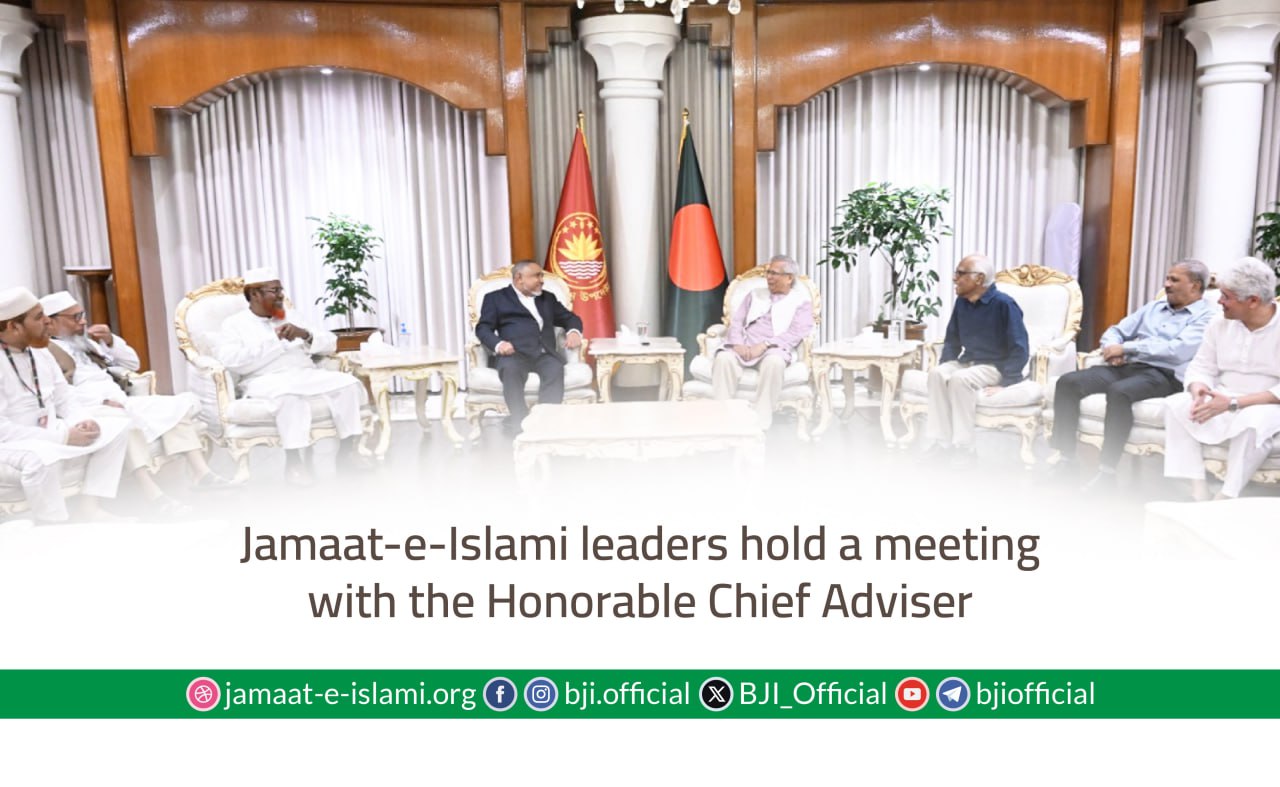On 22 October (Wednesday) at 6:00 PM, a four-member delegation of Bangladesh Jamaat-e-Islami, led by it’s Nayeb-e-Ameer and former MP Dr. Syed Abdullah Mohammad Taher, met with the Honorable Chief Adviser Professor Dr. Muhammad Yunus at the State Guest House, Jamuna. The Jamaat delegation also included the it’s Secretary General and former MP Professor Mia Golam Porwar, Assistant Secretary General Maulana ATM Masum, and Maulana Rafiqul Islam Khan. The meeting was held in a cordial and friendly atmosphere.
After the meeting, Dr. Syed Abdullah Mohammad Taher, in a press briefing, said: “Various political parties have already signed the July National Charter. The Honorable Chief Adviser has thanked Jamaat-e-Islami for signing the July National Charter. We stated that now it is necessary to implement it on a legal basis. Matters related to elections should first be passed based on this Charter, and then a national election should be held accordingly. The Honorable Chief Adviser agreed with us, saying, ‘If the July National Charter is not implemented, all our efforts will be in vain.’ He also said, ‘I will take the proper initiative to implement this Charter.’
We further stated that it should be given constitutional status through an order. ‘This is not an extra-constitutional arrangement that a government has the authority to provide in such a situation.’ He agreed with us that it can be done through an order. Everyone advised that the July National Charter should be legalized through an order, and a referendum would be held based on that order.
Regarding the issuance of an ordinance for the July Charter, Dr. Syed Abdullah Mohammad Taher said: “The ordinance is very weak. It does not have the strength to grant constitutional status. But an order is equivalent in terms of power and authority to a constitutional amendment. We have met with our expert committee, which in turn met with the expert committee of the Consensus Commission. Everyone has advised that it should be legalized through an order, and the referendum will be conducted on the basis of that order. It seems that he has agreed with our position. We hope he will proceed accordingly.”
Secondly, concerning the referendum, the BNP initially did not agree. We emphasized this point, and ultimately the BNP agreed to the referendum. We thank BNP for this. However, the BNP is now attempting to create a complication, insisting that the referendum and the national election must be held on the same day. These are two entirely different matters. One concerns electing representatives to determine how the government will run the country, while the referendum concerns fundamental reforms such as how the government will operate, how elections will be conducted fairly, and the powers of the Prime Minister. It has no relation to the national elections. Therefore, we said that the reforms must be passed through the referendum. If the public says ‘yes,’ it will pass. If the public says ‘no,’ it will not pass. And if it passes, elections should be conducted accordingly. If not, the elections will be held without considering it.
He said that in Bangladesh, two referendums had taken place earlier: one held within the difference of 17 days, another over 21 days. We suggested holding the referendum at the end of November, leaving another two and a half months for the national elections. Therefore, there is no chance of creating problems in this regard.
He further said that the third complication is the Note of Dissent or Point of Dissent. We have held discussions with 31 parties, of which 29 almost unanimously agreed – that is the main decision. If two parties now say they do not agree, it will not cancel the decision; it only constitutes a dissent or note of dissent. Calling a new referendum or demanding a new decision based on one or two parties’ disagreement is not correct. These are unnecessary complications, which we want to avoid to proceed on the right path.
He said that a free, fair, credible, and participatory election is crucial for us. Various parties are creating complications to destabilize the country. Therefore, I appeal to all political parties to act in a way that allows us to go to elections in February in a joyful environment without creating any complications.
We also mentioned that, as you know, in the Election Commission, Secretariat, police administration, and other key positions, about 70–80% of officers are loyal to one party. We said that you are like a caretaker government, playing a neutral role and creating a level playing field. Where transfers are needed, they should be made. The Chief Adviser told us that he himself will supervise and ensure postings through a lottery system. We have no objection to this, but it must be ensured that there is no hidden influence behind the lottery system.
